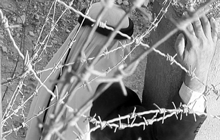Simone Bitton’s documentary suggests the futility of Israeli security fences
Mountain ranges and bodies of water have often served as natural boundaries between people and nations. A wall, however, is a man-made barrier most unna
tural, and that is the message, both spoken and tacit, in the new documentary "Wall."
Filmmaker Simone Bitton, an Israeli citizen who is from Morocco and considers herself Arabic, presents people from both sides of the wall, also known as the "security fence," currently being constructed by the Israeli government in its desperation to stop suicide bombings.
The government’s logic has been that since the Gaza Strip became completely walled in, very few bombers have come from that area. So now, a wall is going up around parts of the West Bank as well.
The genius of Bitton’s film is that she lets the wall and the country do a lot of the talking for her. She shows the countryside as panel after panel of concrete wall goes up to blot out the scenery. Even when the camera stands far from the wall, showing the entire landscape, the wall is rarely out of view. It is a glaringly intrusive construct in one of the world’s most beautiful places.
In addition to showing what an eyesore the wall is, Bitton also talks to a variety of people, from Israelis and Palestinians living directly adjacent to the wall to an Israeli military official who defends the wall and how it operates. More than just a wall, this new hardening of the border that puts Jews and Muslims literally on opposite sides also involves an intricate security zone that includes ditches, razor wire, dirt and paved roads, and electronic sensors. Watchtowers punctuate the wall to give soldiers convenient vantage points. And of course, it costs millions of dollars per kilometer of "security."
The terrorists and the bureaucrats are far from the heart of this film, though, as Bitton speaks to everyday people affected by the new security measure. She speaks to Palestinians hired to build the wall, who have grabbed on to the only sure employment they have. Israelis acknowledge that Palestinians will be separated from their farms and their jobs on the far side of the wall, making what was once a simple walk to work an ordeal of lengthy waits at checkpoints.
The wall even separates friends. An Israeli man who became close to the mayor of the neighboring Palestinian town can no longer host his friend for dinner or go to the movies with him.
Some of the Palestinians talk of Israeli plots to steal their land, but most focus more on how the wall makes peace seem even more elusive. People from both sides resent being told, "Israeli Jews on this side, Muslims on this side." And the military man’s talk of electronic sensors and soldiers showing up "within minutes" is undercut by Bitton’s footage of Palestinians simply climbing over the wall in more populated areas. Like water, people always seek the most direct route.
There are many films that take on the Palestinian-Israeli conflict and history, but "Wall" details the problems when negotiation ceases to be a credible means of resolving conflict. The film appeals more to the heart than it does to politics or history, showing in stark, but simple terms the futility of dividing a house that has the potential to stand united, if in fact the people we meet in "Wall" are indicative of a silent majority in the area, too afraid to speak up. Must of the wall Bitton films is painted, with political graffiti or trompe l’oeil murals, reminiscent of another divisive barrier that in the end fell famously.
gaycitynews.com




































